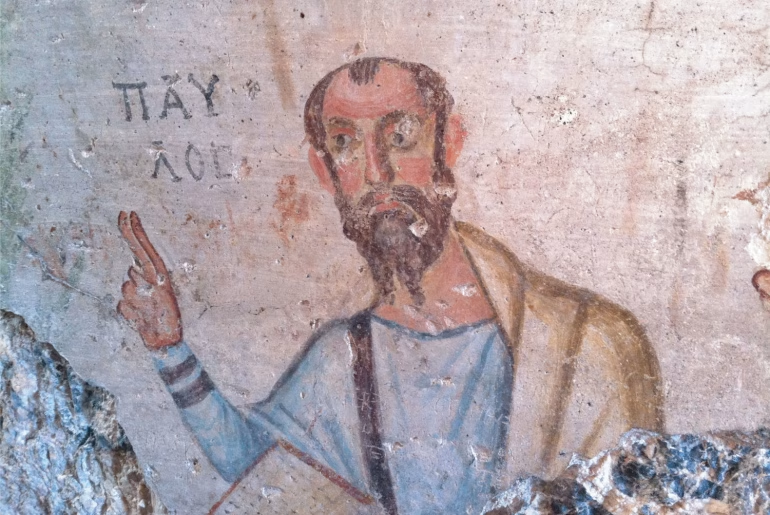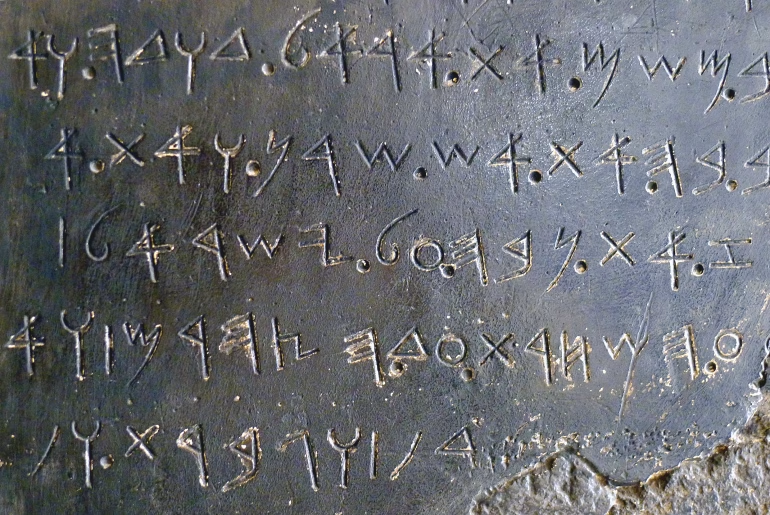Is there homosexuality in the Bible ? The Bible endorses homosexual behaviour and we shall provide one such example, which is exemplified in the story of the relationship between Daniel and the prince of the eunuchs. The verse is :
-
“Vayiten ha-Elohim et-Daniyel leKHesed u’leraKHamim lifnei sar hasarisim” (Daniel 1:9)
[i.e., “Now God had brought Daniel into favor and tender love with the prince of the eunuchs” (KJV).]
The Hebrew words, which describe the relationship between Daniel and the prince of the Eunuchs, are “KHesed” and “RaHamim”.
The first of these indeed means “goodness, kindness, faithfulness”. The word “RaHamim”, however, derives from the Semitic root R‑H-M, which refers to a womb.1 The KJV’s rendering of “RaHamim” as “tender love” would therefore entail and indespensible element of physical love, or love which is manifested through physical contact.
Now, look at our two characters : The prince of the eunuchs is of course an eunuch. Daniel, in the opinion of the Jewish commentators, was also an eunuch.2 Hence an affair between them involving physical love would correctly be termed as a homosexual affair (i.e., between an eunuch and another eunuch).
Of course there is no “twisting” done to the sense or material of the verse, which are presented as they stand. Some may object that it is quite impossible for an eunuch to have any sexual contact. I would like to highlight this argument by pointing out an even more elementary matter : the deprivation of the testes or external genitals in a man or boy does not result in the change of sex of the same to a woman or girl. Hence the “tender love” between Daniel and the prince of the eunuchs would nonetheless remain a homosexual affair.
Secondly, the terms “eunuch” and “castration” are invariably spoken of male subjects ; the correct corresponding term for females is “spaying”.
Thirdly, why should one entertain the possibility that the eunuch (as in Daniel’s “prince of the eunuchs”), would have to be the active sexual partner, when the common sense assigns to him the passive role ?
Fourthly, it is also abundantly clear that this is not the only homosexual affair from the Bible. It is also believed that Jonathan and David too (according to the Biblical account) were more than just the “closest of friends”; they were passionate homosexual lovers.3
The Bible, like any rich and complex text, can be seen to contain multiple layers of meaning, some of which might indeed suggest an endorsement of homosexuality. Hence from this brief exposition, it is inconceivable that the “word of God” would condone such a horrible and unnatural sexual act, as the Bible obviously does.
- See The Brown-Driver-Briggs Hebrew and English Lexicon (Hendrickson Publishers, 2001), p. 933 ; c.f. Strong’s no 7356[↩]
- The statement, that Daniel was a eunuch, is quoted by Origen with approbation in his “Commentary to Matthew”, Book xv, section 5 : “For the children of the Hebrews say that Daniel and his three companions Hananiah, Azariah, and Mishael were eunuchized in Babylon and thus was fulfilled what Isaiah said to Hezekiah : “They will take from your seed and make of them eunuchs in the house of the king of Babylon” [Isaiah 39:7]”[↩]
- The interested reader can read a 170-page book on this very issue.[↩]





6 Comments
Wow, shadowoffears, if the all those Books are misinterpreted, then you might as well throw the entire Bible away. Those passages are translated directly from the Hebrew and Greek passages. I don’t see how you could have any proof that the translations and interpretations could be that erroneous. You didn’t even state any proof or evidence to support your claims. You’ve been brainwashed by modern day catholicism.
I can’t believe you all are trying to justify what is clearly stated as SIN in the Bible. First of all, did the Bible not say that God made marriage for man and woman ? Second, as Leviticus 18:22 states, “Thou shalt not lie with mankind, as with womankind : it is abomination.” If God forbid marriage between two of the same sexes and forbids premarital sex, then how would it be possible for homosexual acts to be ok ?
1 Corinthians 6:9 states, “Do you not know that the wicked will not inherit the kingdom of God ? Do not be deceived : Neither the sexually immoral nor idolaters nor adulterers nor male prostitutes nor homosexual offenders.” Homosexuality isn’t a greater sin than any other sin, but it is still sin. The act of lust in homosexuality is indeed sin because after all, it is still lust and adultery.
I sympathize with gays because of the discrimination and prejudice that they must face. Any sinner that condemns and criticizes you for being a homosexual is a HYPOCRITE.
if you’re wondering if there are Biblical passages which condemn homosexuals and homosexual acts, the answer is NO.
Most people, even priests and scholars, are unaware that the passages about homosexuality have been either misinterpreted or misunderstood.
The story of Sodom and Gomorrah ? That’s a warning against rape and inhospitality. The reason for Sodom’s destruction is made clear in Ezekiel 16:48 – 50. According to Ezekiel, the sins of Sodom were pride, laziness, being inhospitable, neglecting the needs of the poor, greed, and idolatry (the worshipping of idols). Nothing about homosexuality is mentioned.
Leviticus ? Those passages were part of the Holiness Code which has been done away with and is no longer binding to modern-day Christians.
1 Corinthians ? Mistranslation — the word malakee in this passage is used elsewhere in the Bible to mean someone who lacks discipline or one who is morally weak, and never is it used in reference to sexuality or gender.
1 Timothy ? Also a mistranslation. 1 Timothy was an admonishment against male prostitution, not committed, loving same sex relationships.
Romans ? In the passage the Greek words physin and paraphysin have been translated to mean natural and unnatural respectively. Contrary to popular belief, the word paraphysin does not mean “to go against the laws of nature”, but rather implies action which is uncharacteristic for that particular person. An example of the word paraphysin is used in Romans 11:24, where God acts in an uncharacteristic (paraphysin) way to accept the Gentiles. When the scripture is understood correctly, it seems to imply that it would be unnatural for a homosexual to live as a heterosexual and vice versa.
According to the article, “it is inconceivable that the “word of God” would condone such a horrible and unnatural sexual act, as the Bible obviously does.”
I believe you are correct about the Bible. Through a series of politically motivated mistranslations, scripture condemning acts such as child molestation have been modified to pertain to homosexuality. Once these mistranslations have been culled, the New Testament seems to be about love, tolerance, forgiveness, and nonjudgment. Although I am not a Christian, I respect this philosophy and wish that you Muslims shared it. After all, “horrible and unnatural” are harsh words of judgment — YOUR judgment, not God’s. As an agnostic and as a lesbian woman, I assure you I could find a few harsh and intolerant things to say about what you represent, but I won’t. That would not be in the spirit of peace and love.
May you find tolerance in your hearts towards others, and may your god have mercy on you !
You all are wrong if you think the Holy Bible promotes homosexuality. Have you never read Romans ch.1 ?
One of the arts of Biblical interpretation is not to take a passage out by itself but must be read in the context in which “it is intended” No scripture contradicts any other scripture in the Holy Bible.
Matthew
Anyway gay marriages are getting approved and legalized all over Europe and USA, so whats new ?